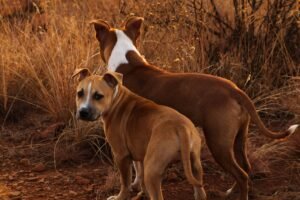Basset puppies are a delightful addition to any home. Their long ears and soulful eyes are hard to resist. These charming pups are known for their gentle nature and loyalty.
If you’re considering a Basset puppy, you’re in for a treat. They are affectionate and make great companions. However, they come with unique needs that require attention. Bassets are scent hounds, originally bred for hunting. This means they have a strong sense of smell. They can be easily distracted by scents, so training is essential. These puppies are generally good with children and other pets. Their laid-back demeanor makes them a popular choice for families. But they can be stubborn, requiring patience and consistency in training. Bassets are prone to obesity, so a balanced diet and regular exercise are crucial. Their long ears need regular cleaning to prevent infections. Despite their short coat, they require minimal grooming.
Before bringing a Basset puppy home, it’s important to prepare. Understanding their needs will ensure a smooth transition. This guide will provide you with practical tips and advice.
Meet the Basset: Breed Overview and History
Basset Hounds are a beloved breed known for their distinctive features and endearing nature. Originating in France, these dogs were bred for hunting small game like rabbits. Their name, “Basset,” even means “low” in French, a nod to their short stature.
These dogs are part of the Hound Group, recognized by the American Kennel Club. Despite their calm demeanor, Bassets are persistent and determined, making them excellent scent trackers. One of their most notable traits is their strong sense of smell. It’s second only to the Bloodhound, giving them an edge in scent-tracking activities. This makes them ideal for search and rescue missions.
Bassets are recognized for their droopy eyes and long, sweeping ears. These ears not only add to their charm but also help direct scents towards their nose. Their loose skin and low-set frame give them a distinctive, charming appearance.
Here’s a quick overview of Basset Hound features:
- Long, drooping ears
- Short, sturdy legs
- Loose, elastic skin
- Strong, muscular build
This breed has been featured in various media and culture, enhancing its popularity. Despite their origins as hunters, today, Bassets are more commonly seen in family homes as beloved companions.
Choosing Your Basset Puppy: Types, Colors, and Mixes
Selecting the right Basset puppy is an exciting journey. Basset Hounds come in various types and mixes, each with unique features. Understanding these can help you find the perfect match for your lifestyle.
Bassets are typically medium-sized dogs with a sturdy build. They have several color varieties, such as tricolor, lemon and white, and red and white. Each coat pattern offers a unique aesthetic, making each Basset visually distinct.
Here’s a list of common Basset color variations:
- Tricolor (black, white, and tan)
- Lemon and white
- Red and white
Apart from standard Basset Hounds, you might encounter mixes that combine traits from other breeds. Popular mixes include the Basset-Lab and Beagle-Basset, known for combining the best of both breeds. These mixes can have varied appearances and temperaments.
Popular Basset Mixes Include:
- Lab Basset Hound Mix
- Beagle Basset Mix
- Basset Griffon Vendéen Mix
When choosing, consider the personality traits typical of the Basset Hound. They are affectionate and loyal but might be stubborn during training. This can influence how you approach their care and upbringing.
If you’re interested in a European Basset Hound puppy or other regional varieties, research breeders specializing in these distinct lines. They might have subtle differences in appearance or temperament influenced by their lineage.
Understanding the types and mixes helps ensure you’re ready for the unique challenges and joys each variety brings. A well-informed choice can lead to a fulfilling companionship with your Basset puppy.

Finding a Reputable Breeder or Rescue
Bringing a Basset puppy into your home starts with choosing a reputable breeder or rescue. This ensures you adopt a healthy, well-adjusted puppy. Knowing where to look is key to finding the best source.
Research is crucial when selecting a breeder. Look for breeders with a good reputation who can provide health clearances for their dogs. They should follow ethical breeding practices, focusing on the health and temperament of their puppies.
Indicators of a reputable breeder include:
- Willingness to show health certifications
- Positive reviews from previous buyers
- A clean and caring environment for their dogs
Alternatively, adopting from a rescue can be a rewarding option. Many rescues have Basset Hounds of all ages looking for loving homes. Rescues often provide full background information on their dogs, helping you understand their needs.
It’s essential to visit the breeder or rescue in person if possible. Seeing the living conditions and meeting the puppy’s parents can give you confidence in your choice. This visit also allows you to observe any potential health or behavioral issues firsthand.
Finding the right breeder or rescue takes time and effort, but it’s worth ensuring a healthy, happy addition to your family. With thorough research and careful consideration, you can start your journey with a well-bred or lovingly rescued Basset puppy.
Preparing Your Home for a Basset Puppy
Welcoming a Basset puppy home is a joyous occasion, but preparation is key. Creating a safe, comfortable environment should be your first step. This ensures your new furry friend feels secure.
Start by puppy-proofing your space. Remove any items that could be harmful if chewed or swallowed. Electrical cords, small objects, and plants should be kept out of reach.
Here are a few essentials to have ready:
- A soft, supportive bed for comfortable rest
- Safe chew toys to satisfy their instinct
- Puppy gates to restrict access to certain areas
Make a dedicated spot for eating and drinking. Consistent feeding routines can help your Basset adjust. Also, designate a bathroom area for easier potty training.
Routine is crucial, so set a daily schedule. Include feeding, playtime, training, and rest periods. This structure will help your puppy settle into their new environment.
With careful planning and attention to detail, your home can become the perfect sanctuary for your Basset puppy. Enjoy the adventure of puppyhood with confidence and preparedness.
The First Days: Bringing Your Basset Puppy Home
The first few days with your Basset puppy are both exciting and vital. It’s a time for bonding and setting routines. Patience and understanding are your best tools.
When you first arrive home, allow your puppy to explore. Let them sniff around and get familiar with their new surroundings. Supervision is important to ensure safety.
Keep introductions to family members and pets gradual. Too many new faces can overwhelm your puppy. Allow interaction in short, supervised sessions to begin with.
Here are important steps to follow during these first days:
- Maintain a calm environment to reduce stress
- Stick to a consistent feeding and potty schedule
- Provide plenty of gentle affection and reassurance
Avoid noise and disruptions when settling your puppy in their sleeping area. A quiet, cozy spot will help them feel secure and adjust faster. Nighttime may be challenging at first as they adapt to their new routine.
These early days lay the groundwork for a happy, well-adjusted pet. Relish each moment and build a strong, lasting bond.

Nutrition and Feeding: What to Feed Your Basset Puppy
A balanced diet is crucial for your Basset puppy’s growth and health. Choosing the right food involves considering your puppy’s specific needs and characteristics. It’s important to provide high-quality nutrition from the start.
Puppies require food rich in protein and fats to support their rapid growth. Look for formulas specially made for puppies. They contain the nutrients necessary for development.
When selecting food, keep these elements in mind:
- Choose brands with meat as the first ingredient
- Ensure the formula supports bone development
- Avoid brands with fillers like corn or soy
Feeding your puppy an age-appropriate diet helps prevent obesity. Portions should be controlled, and meals evenly spaced throughout the day. Typically, puppies need three small meals daily.
Consider incorporating these practices into their feeding routine:
- Stick to a consistent feeding schedule
- Measure portions accurately to avoid overfeeding
- Adjust food quantities as your puppy grows
Transitioning food should be gradual to prevent digestive upsets. Mix the new food with the old over a week, gradually increasing the new until the switch is complete.
Proper nutrition supports your Basset puppy’s health and happiness. Consult your vet for recommendations tailored to your puppy’s specific needs.

Training Your Basset Puppy: Tips for Success
Training a Basset puppy requires patience and consistency due to their stubborn nature. However, with the right approach, you can achieve great results. Start training early to establish good habits.
Positive reinforcement is key when training a Basset. They respond well to rewards and praise. Make training sessions short, keeping them fun and engaging to maintain your puppy’s interest.
Start with basic commands such as “sit,” “stay,” and “come.” These commands lay the foundation for more advanced training. Remember, practice makes perfect.
Here are some essential tips for training your Basset:
- Use treats and verbal praise to encourage good behavior
- Keep training sessions short to hold their attention
- Be patient and consistent with your commands
Socialization is just as crucial as command training. Expose your puppy to various environments, people, and animals. This helps them become well-adjusted adults.
Implement the following strategies to ensure effective socialization:
- Introduce your puppy to different situations gradually
- Encourage positive interactions with other dogs and people
- Take your puppy to new places for exploration
Training a Basset puppy is rewarding when approached with patience and care. Building a strong bond through training enriches your relationship with your furry companion.
Remember to end training sessions on a positive note. Your puppy will look forward to the next session eagerly, strengthening their confidence and trust.
Socialization and Behavior: Raising a Well-Adjusted Basset
Raising a well-adjusted Basset puppy requires a focus on socialization from an early age. Socialization helps prevent behavioral issues such as shyness or aggression. Introduce your puppy to new experiences gradually.
Bassets are naturally friendly and curious, which makes socialization easier. They enjoy meeting new people and other dogs. However, ensure each new experience is positive for your puppy.
Here are some effective ways to socialize your Basset:
- Take regular walks around diverse neighborhoods
- Arrange playdates with well-behaved dogs
- Introduce your puppy to different sights and sounds
It’s essential to observe your puppy’s reactions during socialization. If they seem scared or overwhelmed, take a step back and proceed at their pace. Patience is crucial.
Consistency in socialization helps build confidence in your Basset. Regular exposure to various environments and situations ensures they grow into well-rounded adults. This process strengthens their adaptability and eases integration into family life.

Exercise and Play: Keeping Your Basset Healthy and Happy
Exercise is key to maintaining a healthy and happy Basset puppy. Although Bassets are not the most energetic breed, they need regular activity. Daily walks are ideal for their physical and mental well-being.
Basset puppies are prone to weight gain, so it’s important to balance their diet with exercise. In addition to walks, short play sessions help burn energy. Consider activities that engage their natural scent-tracking abilities.
Here are some playful activities to try:
- Hide-and-seek with treats
- Tug-of-war with sturdy toys
- Scent-tracking games in the yard
Bassets have a strong sense of smell and love following scents. Incorporating scent-based activities can make exercise more enjoyable for them. Remember to provide ample opportunities for rest, too.
Pay attention to your puppy’s limits, especially in hot weather. Exercise should be fun, not a chore. By combining exercise with play, you’ll nurture a bond with your Basset and contribute to a well-balanced lifestyle.

Grooming and General Care: Ears, Coat, and More
Basset puppies come with long ears and a short coat that needs special attention. Their ears can trap dirt and moisture, leading to infections. Regular ear checks and cleanings help prevent these issues.
Their coat is short and dense, so grooming is minimal but necessary. Weekly brushing is sufficient to remove loose hair and reduce shedding. It also keeps their coat shiny and healthy.
Here’s a quick grooming checklist for your Basset puppy:
- Clean ears weekly
- Brush coat weekly
- Trim nails regularly
- Check teeth and gums
Nail trimming is crucial to prevent discomfort and joint issues. If you hear their nails tapping on hard floors, they’re too long. Dental care is equally important; brushing their teeth regularly helps prevent dental problems.
Basset puppies thrive with consistent care routines. Besides grooming, ensure you provide regular vet visits. By maintaining these practices, you promote overall health and comfort for your Basset puppy.

Common Health Concerns in Basset Puppies
Basset puppies, like any breed, have specific health concerns to watch for. Awareness and early intervention are key to ensuring your puppy thrives.
One major concern is hip dysplasia. This condition can cause discomfort and mobility issues. Regular vet check-ups can help detect early signs and allow for timely treatment.
Bloat is another serious issue that can affect Bassets. It happens when the stomach twists and fills with gas. Quick veterinary care is crucial if you suspect bloat in your puppy.
Here’s a list of common health concerns for Basset puppies:
- Hip dysplasia
- Bloat
- Ear infections
- Obesity
Ear infections are frequent due to their long ears, which trap moisture and dirt. Regular cleaning helps reduce the risk, but watch for signs like head shaking or redness.
Obesity is a common problem in Bassets due to their love of food and low activity level. A balanced diet and regular exercise are essential for maintaining a healthy weight.
Regular veterinary care is vital in preventing and managing these health concerns. By staying informed and proactive, you can provide your Basset puppy with a healthy, happy life.

Living with a Basset: Family Life, Kids, and Other Pets
Living with a Basset puppy can be a rewarding experience. Their gentle and affectionate nature makes them fantastic companions for families.
Bassets are known for being patient and tolerant with children. They enjoy playtime and are generally good-natured. Supervision is important, as with any dog-child interaction, to ensure safety and fun for both.
These dogs are social creatures and enjoy being part of a family pack. Their strong bond with humans extends to other pets as well. With proper introductions and socialization, Bassets can get along with both dogs and cats.
It’s beneficial to teach children how to interact with a Basset safely and respectfully. Encourage gentle petting and discourage pulling their long ears or tail.
Here’s a summary of living with Bassets in a family setting:
- Gentle and affectionate with children
- Socialize and enjoy other pets’ company
- Require supervision with young kids
Involving the whole family in your Basset’s care can strengthen the bond. Whether it’s feeding, walking, or playtime, shared responsibilities can enrich everyone’s life.

Basset Puppies Across the US: Regional Considerations
Basset puppies are beloved across the United States. Their charming personalities capture hearts from coast to coast. However, regional factors can affect raising a Basset puppy.
Climate plays a significant role. In warmer states like Texas or California, you may need to keep an eye on your pup during hot days. Ensure they have shaded areas and plenty of water. Cooler states, such as Maine or Washington, offer a more comfortable environment for Bassets’ playtime and walks.
Access to veterinary care also varies by region. Urban areas often have more vets, making regular check-ups more convenient. In rural areas, planning ahead for health check-ups is essential. Connecting with local Basset communities in places like New England or Ohio can provide valuable support and advice.
Here’s a quick list of regional considerations:
- Climate adjustments for care
- Availability of local veterinarians
- Connecting with local Basset owners
Understanding these regional factors helps ensure your Basset puppy thrives wherever you are.
Frequently Asked Questions About Basset Puppies
Basset puppies come with their own unique quirks and care needs. First-time owners often have many questions. Here are answers to some common inquiries.
One question is about Basset’s exercise needs. While Bassets love lounging, they still need daily walks to stay healthy. Aim for moderate exercise each day to keep them in shape.
Many wonder about the best diet for their pup. Bassets thrive on balanced diets formulated for medium breeds. Monitor portions to prevent obesity, as their love for food is well-known.
Grooming is another frequent topic. Bassets have short coats that require minimal grooming. However, regular ear checks and cleaning are crucial due to their droopy ears.
Here’s a quick FAQ list for easy reference:
- How much exercise do Basset puppies need?
- What’s the best diet for a Basset puppy?
- How often should I groom my Basset?
- Do Bassets get along with children and other pets?
Keeping these points in mind will help new owners navigate the joys of raising a Basset puppy.
Final Thoughts: Is a Basset Puppy Right for You?
Deciding if a Basset puppy is a good fit for your family involves considering their unique traits. Known for their affectionate nature, Bassets make excellent companions. They thrive in loving households that offer attention and companionship.
Bassets are perfect for families, but their stubborn streak requires patient training. If you’re ready for a pet that needs consistent, positive reinforcement, a Basset could be a great choice. They can be independent but bond well with family members.
Consider your home environment and lifestyle. Bassets adapt well to various living situations, from apartments to houses with yards. Just ensure they have enough space for play and exercise, both indoors and outdoors. Their low-energy demeanor indoors contrasts with their enthusiasm for outdoor activities.
Ultimately, Bassets are loyal, loving, and charming dogs. If you embrace their quirks, you’ll find a delightful companion in a Basset puppy. Remember, they bring joy, loyalty, and an unmistakable charm to any home.
Key Takeaways
Basset Hounds are lovable, short-legged dogs originally bred for hunting. Known for their playful, charming, and sociable personalities, they thrive on companionship and make fantastic family pets.
While they have a reputation for being independent and sometimes stubborn, many Basset Hounds enjoy learning and can excel in training when approached with patience and positivity. Despite their relaxed appearance, they need regular exercise to stay healthy.
Basset Hounds are heavy shedders, so be prepared for routine grooming and cleaning to keep their coat and your home in good condition. Additionally, they may be prone to certain health issues such as hip dysplasia, thrombopathia, and ear infections. Regular check-ups with your vet and quick attention to unusual symptoms are crucial. Many owners also choose to invest in pet insurance as an extra layer of protection.





